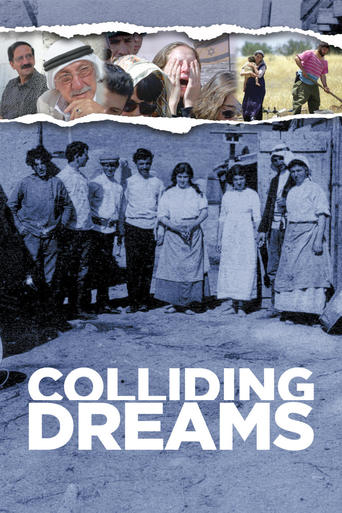Matcollis
This Movie Can Only Be Described With One Word.
Glucedee
It's hard to see any effort in the film. There's no comedy to speak of, no real drama and, worst of all.
Fairaher
The film makes a home in your brain and the only cure is to see it again.
Melanie Bouvet
The movie's not perfect, but it sticks the landing of its message. It was engaging - thrilling at times - and I personally thought it was a great time.
jnathanson-39131
In this film we meet Israelis who have incredible histories, and through them we, as American viewers, come into deeper contact with the history of Israel. We start to feel a relationship with these speakers, without knowing, for most of the film, where they are on the political spectrum. The impossibly complex story of Israel is told through the personal stories of the speakers, and also from footage of the events. It becomes a very powerful telling and I think that everyone who sees the film will feel the the greatness of the country and the extreme difficulties of it's internal conflicts and divisions. The filmmakers made excellent choices of who to interview; there are some great people on screen. I wish this film could be seen by so many people who know only one side of the issues of the other. The filmmakers have done their best to balance a number of perspectives.
LucyONYC
I thought Colliding Dreams was excellent, and incredibly engaging. (Didn't look at my watch once!) It was really well balanced with a diversity of voices and opinions and tons of important, and frequently eye-opening, information. I was particularly fascinated to learn about the roots of Zionism and the goals and dreams of the early settlers. And of course the arc of those dreams is so complex and the current situation so seemingly intractable that one leaves the film with both heartbreak and hope, but above all with the sense of the urgency with which answers must be found.This is an important movie--rich, informative, and absorbing.
wrkcwnwnx
I won't repeat the excellent and thorough review above, except to state that this film is seriously defective and racist. According to the film maker, who I met this evening, he is trying to discuss the conflict from an Israeli view. However, he gives ample time to Arabs and does not balance their errors with corrective interviews, The general tone goes like this,"if the mature Jews would be nice to the Arab children, the children will be behave and we can all get along". It's all about what the Jews have done wrong. He states that there were no problems between Arabs and Jews until the Zionist arrived. Wrong. He states that the PLO/PA has recognized Israel. Wrong. He states that Israel needs to leave the west bank but does not state that the PA has rejected peace deals from three Israeli Prime Ministers. I could go on, but let me summarize like this, if you want to see a biased film which bashes Jews and never asks Arabs to take responsibility for their actions, then this is the film for you. If you want a film that examines the complexity of the Israeli-Arab conflict, or a film which looks at the complexity of internal Israeli conflicts and movements, look elsewhere.
kalkrause
This film was written, directed and produced by Joseph Dorman and Oren Rudavsky. It should have much to recommend it. Zionism, the nationalistic movement that galvanized many secular Jews of late 19th and early 20th centuries, was one of a pantheon of nationalisms spawned in the later half of the 19th century. An ambitious film, "The Zionist Idea" ultimately fails to satisfy. The reason is simple. Rather than being an honest, serious film about Zionism, the film is at it's heart a polemic on the "roots' of the Jewish Palestinian problem. A better title for the film might have been "Two Peoples, One Land" or perhaps "How the Oppressed of Europe came to Steal and Occupy a Land that was Not their Own", or even "What went wrong with Zionism?"Messrs. Dorman and Rudavsky are not really telling the story of Zionism, they are telling the story of what the Zionist vision did to the Arabs that lived in Palestine. At the outset, the film clearly identifies the Arabs of Palestine had always been know as Palestinians. These people are assume to have enjoyed a long history of people-hood distinct from other Arabs. How this trite and perverse a distortion gets woven into the narrative is disturbing to say the least. Hanan Ashrawi (PLO spokeswomen) is pictured in the first 5 minutes of the film asserting the rights of Palestinians as if this people had existed for centuries. The plain truth is that the inhabitants of Palestine in 1900 were Arabs, Christians and Jews, all subjects of the Turks.Not until 1967 when Yasser Arafat renamed his ragtag army the Palestinian Liberation Army where these Arabs awarded an identity. During the period of Turkish rule and then after under the British Mandate period the name Palestinians applied to Jews until 1948. "..it was common for the international press to label Jews, not Arabs, living in the mandate as Palestinians. It was not until years after Israeli independence that the Arabs living in the West Bank and Gaza Strip were called Palestinians. In fact, Arabs cannot even correctly pronounce the word Palestine in their native tongue, referring to area rather as"Filastin." Unfortunately, this is but one example of the rewriting of historical fact that is manufactured by Dorman and Rudavsky in order to tell their version of the truth.Accomplished film makers perhaps, Messrs. Dorman and Rudavsky have little in the way of credentials for the narrative. Their knowledge of historical background of region is surprisingly thin, and much worse, it is quite selective. Important historical events are glossed over (the Balfour Declaration) or as is the case of The Treaty of San Remo, signed in 1920, entirely left out of the film. To take the absence of the Treaty of San Remo as an example, this Treaty ended the war between the Allies and Turkey and settled the future of the lands that had been ruled by the Ottoman Turks for centuries. This Treaty was ratified by all 52 nations in the League of Nations and gave Jews the legal right to settle Palestine while recognizing the rights of Arabs to create their own states in Syria and Iraq under the Mandate System. This Treaty assigned Palestine as a future home of the Jews and was welcomed by the leaders of Arab people of the day.Worst still this lack of background, Dorman and Rudavsky took the Zionist story and used that as an excuse to portray Arabs solely as "victims". Their land was stolen, their property seized, their birthright expunged by Jews driven from an anti-Semitic Europe. With nearly 165 minutes of interviews, new clips and narrative, the Arabs of Palestine are incarnated as the latest version of a people colonized by the West, this time with the Jews as oppressors. "The Zionist Idea" shows us educated Jews pleading with the audience to understand that the Jews who left Europe after the Holocaust had nowhere else to go (and by implication they are really sorry for the harm done to the indigenous Arab population). But there is no balance when presenting the Arab side of the story. We are treated to Arab/ Palestinian politicians, intellectuals and historians that clearly are ever so pleased to proclaim that they are the real victims. They want their land back. Why can't these same Palestinian politicians, intellectuals and historians own up to the programs of real causes of the riots of 1290, 1923, 1929 and 1937. Or was there any mention of the clearly incendiary and anti- Semitic actions of the Mufti of Jerusalem. Or are we treated to a full throated apology from the Palestinian victims for the wholesale displacement of large scale Sephardic communities of the Levant by their Arab brethren. The Palestinian narrative comes across as one sided and unapologetic, given over without comment and presented as fact. Moral right in this story is painfully obvious"The Zionist Idea" could have been so much more. Zionism truly inspired a nation. A nation of liberated Jews was reborn in their ancestral homeland. These Jews turned a neglected under- utilized wasteland, the backwater of a decaying Ottoman Turkish Empire, into an inspiration to Jews and non-Jews alike. Marginal lands owned by Egyptian and Syrian absentee land holders sold to Jews at exorbitant prices. Jews cleared malarial swamps in order to create a new Zion. Palestinians are presently as they always are: not a people but a cardboard cutout of the "victim", the result of European Colonialism and Zionist racism. What a drab, inaccurate narrative. There are indeed many sad and heart breaking stories woven into the tragedy of the region. My Goodness, my heart breaks at the thought that these talented men can do no better "The Zionist Idea".

